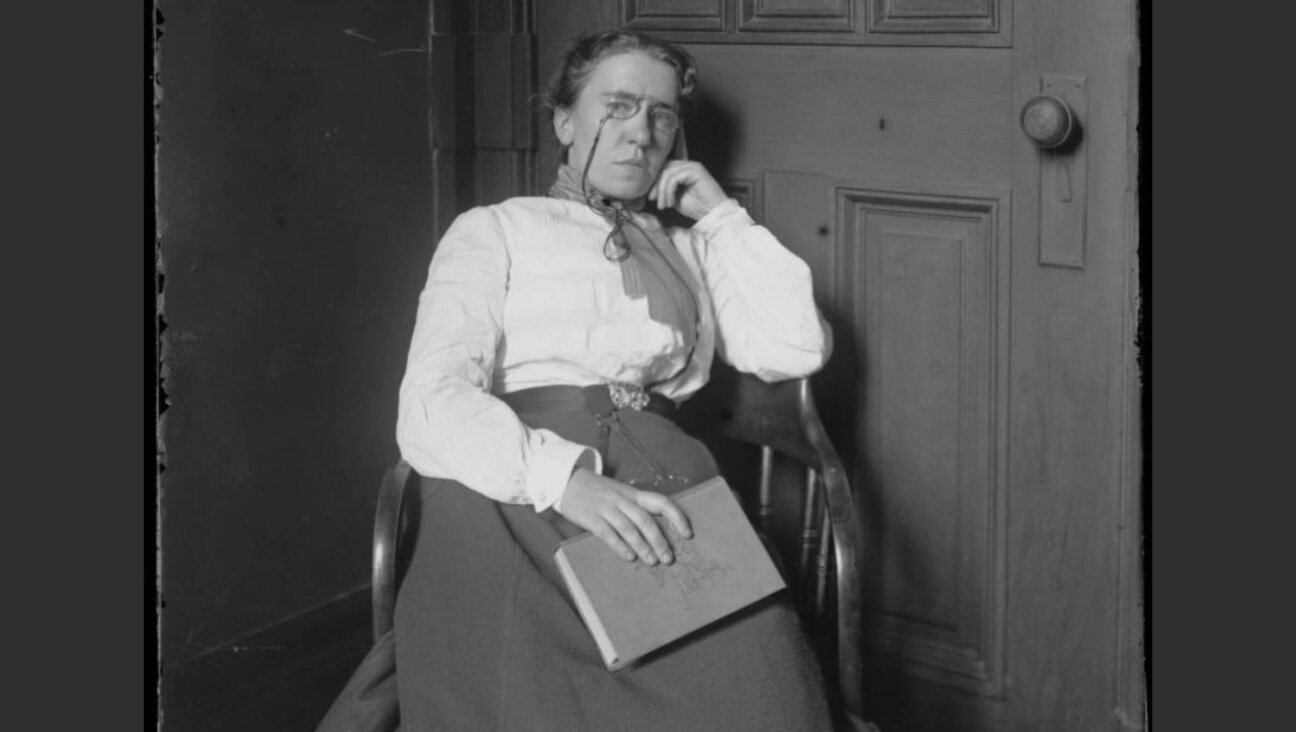Sandy’s Lessons

Image by nate lavey
The city that never sleeps was uncharacteristically quiet as Hurricane Sandy swept through on Monday, October 29: Mass transit shut down, residents scattered to their homes, commerce halted, the usual frenetic energy on streets and byways dialed back to zero. It was as if the entire metropolitan area were taking one big Shabbat nap.
But this was not a restful, rejuvenating time, not for the staff of the Forward, some of whom were unwittingly stuck around North America. And not for millions of others who suddenly found themselves without the bare basics of electricity, heat and running water, and without the new basics — access to the Internet and to mobile phones. It was especially devastating for the families and loved ones of those who perished during this historic storm.
Hurricane Sandy left us with all the trite but true emotions one might expect from an epic exercise of Nature’s power. Fear in its anticipation. Helplessness in its wake. Astonishment at its wrath. Gratitude at its benevolence.
“What it really boils down to is this,” wrote Devra Ferst, our food editor and a member of our digital team. “I have never been so thankful to have a roof over my head.”
Hurricane Sandy also relayed two compelling civic messages that ought not to get lost as the muddy floodwaters recede. The first is that government, for all its flaws, really does work to help its citizens in times of need, especially if it is led well on all levels, which is what seemed to be the case here.
The second message unfortunately has gotten lost in this election season: Climate change is a real and present danger that is being ignored at our great peril, and weather catastrophes like this one will undoubtedly visit us more frequently and with even greater impact unless we act immediately to stop harming our environment.
“It’s all eerily calm here,” staff writer Paul Berger wrote at around noon on October 30 from his home in Montclair, N.J., a train ride away from Manhattan. “We have no heat, but thankfully it’s not too cold. We have no power, but at least we have gas to cook with and hot water.
“I was struck last night by how useful Twitter was to keep us up to speed with all that was happening. It was by far the best method of keeping track of where the storm was and the damage it was wreaking. Once the power went out, though -— around 10.30 p.m. — our strategy moved to conserving battery power on our phones. With no Internet or phone line, these cell phones are now our only link to family, friends, colleagues.” Berger’s family lives in Europe, as does his wife’s.
“But with each email/Twitter check,” he said, “the power bar empties that little bit further. It’s really frustrating. So, too, is the sound of our neighbor’s generator. There are parts of the world where blackouts and generators are the norm. We’re just very lucky to live in a part of the world where these events are rare.”
Yes, we are lucky to live in a part of the world where these events are rare, but we are luckier still to be citizens of a nation with layers of government — federal, state, local — that can and should function as a coherent whole in times of great emergency.
We have seen the opposite, in the inexcusable failures of the Federal Emergency Management Agency and its incompetent, politicized leadership when Hurricane Katrina’s floodwaters overran New Orleans during the George W. Bush administration. FEMA is one of those federal agencies that Republicans love to hate, to starve of funds and to characterize, as Mitt Romney did earlier in the campaign, as an unnecessary hindrance to the delivery of emergency relief.
But in the real world, the world of Hurricane Sandy, even a stalwart Romney ally like Governor Chris Christie of New Jersey set aside politics and had only words of praise for the Obama administration’s efforts to upgrade FEMA. Speaking about the damage to his state on the NBC show “Today,” Christie called the president “outstanding” and said the response from FEMA had been “excellent.”
New York City Mayor Michael Bloomberg, who has stayed neutral in the presidential campaign, echoed the governor’s assessment: “I think the coordination between the city, state and the federal government has been as good as anybody has ever seen. And we appreciate the help of all of them.”
Surely, as the full reckoning of the death and destruction left in Sandy’s wake becomes apparent, there will be examples when more and better could have been done. But at a time when the very functioning of government is derided and mistrusted, it’s important to note when it works.
Still, the overriding emotion on the Forward staff was gratitude. Managing Editor Dan Friedman was stuck in Toronto as the storm hit, unable to get back to his wife and children in Manhattan, but he felt lucky to know that they were safe and sound.
Opinion Editor Gal Beckerman, a relatively new homeowner, was anxious about the tree in his tiny front yard, even more anxious that his wife would go into labor as the storm swept through their Brooklyn neighborhood. He sounded relieved as the Day After wore on. As of this writing, still no baby.
But that awful feeling of helplessness also took hold. Staff writer Seth Berkman’s family and friends live in the eastern part of New Jersey, and he knew that the storm was pounding their homes, flooding their streets, exploding their generators, disrupting their lives.
“As absurd as it may sound, there were times when I wanted to trade places from what was in comparison — serene surroundings in my apartment in Upper Manhattan — to have been in the eye of the storm, just to know how it was affecting those I care for the most,” he wrote. “From afar, you can only hope for the best, a helpless feeling that I’m sure many around the country shared.”
But we are more than helpless in the eye of storms like this one. While scientists still are sorting out the hows and whys of Hurricane Sandy, there is general agreement that steadily rising ocean temperatures contributed to the storm’s ferocity. Scientists are also looking at this year’s historic loss of sea ice in the Arctic as a potential contributor to Sandy’s path, and possibly to the severity of the storm.
And yet, irresponsibly, inexcusably, discussion of climate change has barely registered during this long campaign season. Democrats seem afraid to vocally promote government policies to reduce environmental warming, policies that have to be implemented on a national scale to be effective. And Republicans have cowardly caved to the extremes in their party who dismiss the science altogether.
There’s no other way to say this: We can be grateful for weathering this storm, and prepare better for the next, but unless citizens demand more action from elected officials, and make the individual sacrifices necessary to reduce our own carbon footprints, the stories and feelings and tragedies of storms like Sandy will visit us and others again and again.















